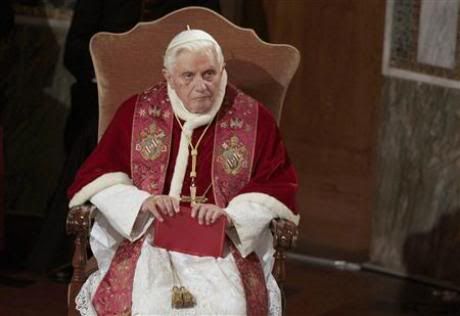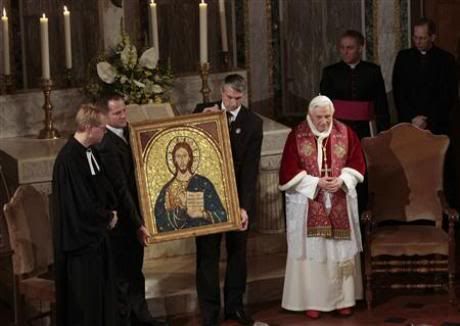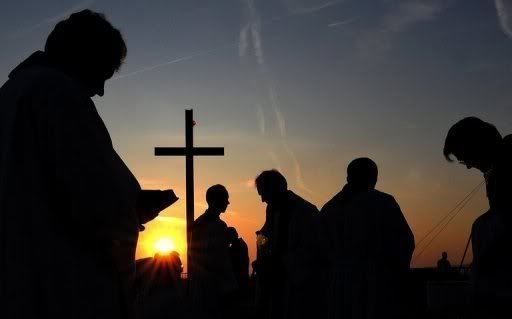----
---
---



The priest was transferred to the diocese in 1980 from Essen where he had been reportedly accused of abusing a young boy
A priest housed with the current pope's approval in 1980 while under suspicion of paedophilia and convicted six years later has been suspended from duty, the pontiff's former diocese said.
The priest, named only as Peter H., 62, "was banned from working with children and young people. He broke this restriction," the diocese of Munich and Freising in southern Germany said in a statement late Monday.
There were no further allegations of abuse, the statement added.
Josef Obermaier, a senior priest charged with overseeing Peter H., also resigned.
The priest was transferred to the diocese in 1980 from the western city of Essen where he had been reportedly accused of abusing an 11-year-old boy.
"I was 11 ... He gave me Bacardi and Coke, then he took off his trousers and forced me into oral sex," the Bild mass-circulation daily quoted the alleged victim, Wilfried Fesselmann, now 41, as saying.
The archbishop of Munich and Freising at the time, Joseph Ratzinger, now Pope Benedict XVI, approved giving the priest Church housing for "therapy", the diocese said on Friday.
Two years later, by which time the pope had been transferred to the Vatican, H. was given pastoral duties in a Bavarian town and in 1986 was given a suspended jail sentence for sexually abusing children.
But he remained within the Church.
Pope Benedict has spoken out several times since the start of his papacy in 2005 on child sex abuse, describing it last month as a "heinous crime" and a "grave sin".
But he has come under fire because he has not yet commented directly on his native Germany, critics say.
Since the first revelations of abuse dating back to the 1970s and 1980s at an elite Jesuit school in Berlin emerged in January, former victims have alleged abuse at two-thirds of Germany's 27 dioceses.
In a further revelation, a monastery in St Ottilien in southern Germany acknowledged on Monday that several monks, now dead, had admitted to acts of abuse in the 1960s. It appealed for victims to come forward.
Victims have been "relieved and even healed when their case is finally discussed, even decades after the abuse and decades of painful silence," the monastery said.
Pope Benedict told Rome's Lutheran congregation on Sunday that Protestants and Roman Catholics should be thankful for all the unity achieved among Christians rather than complain about the slow pace of dialogue.
Addressing about 350 Lutherans in their small church, Benedict said both sides had accused each other of slowing down the ecumenical movement, but that only God, not humans, could create true unity.
The movement has brought Christian churches closer together in recent decades but has lost momentum lately.
Some Protestants, especially in Germany, say Benedict has contributed to that by stressing more strongly the Catholic claim to be the only true church.
They say he also seems more interested in improving ties with the theologically conservative Orthodox churches than with more liberal Protestant groups.
In the Vatican's view, several Protestant churches have drifted away from common ground by ordaining women as priests and bishops or blessing same-sex marriages.
"We have divided the one path into many, so the witness we should give has been obscured," Benedict told the German-speaking congregation, which his predecessor John Paul II visited in 1983, in their common native tongue.
"I think we should first be thankful that there is so much unity. It's nice that we can pray together today, sing the same hymns together, hear the same word of God together, that we can interpret and try to understand it together."
Benedict said only God could create more unity among Christians because "a unity we negotiate ourselves would be human-made and as fragile as everything that humans make."
The leader of the Lutheran community, Doris Esch, recalled that Benedict had helped to work out a Catholic-Lutheran statement in 1999 resolving some theological disagreements dating back to the Reformation, the split between Catholicism and Protestantism, in the 16th century.
"Holy Father, may you feel welcome here," she said.
Germany's churches are planning an ecumenical festival in Munich in May. Some Protestants asked for a joint communion service but the Catholics declined because the two sides do not agree on the nature of this central Christian rite.





0 comments:
Post a Comment